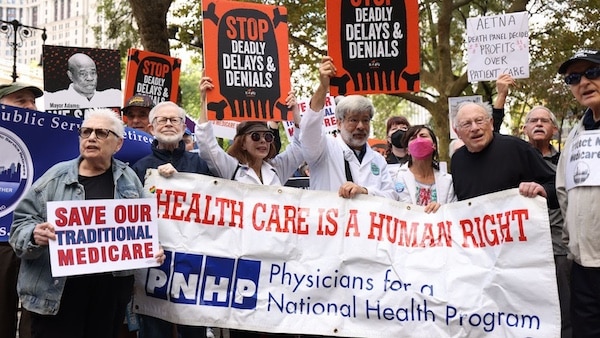




In the United States, the healthcare system is facing significant scrutiny as it grapples with the highest spending globally yet the lowest life expectancy among comparable GDP nations. According to a recent government report, U.S. health care spending rose 7.5% to nearly $5 trillion in 2023, accounting for 17.6% of the economy [fbe7bcdf]. Many Americans are deterred from seeking medical care due to exorbitant costs, a situation exacerbated by the profit-driven nature of the healthcare industry. UnitedHealthcare (UHC) reported a staggering $20 billion in profits for 2022, contributing to a total of over $41 billion in profits across the health insurance sector that year [c1a7952d].
The recent assassination of Brian Thompson, CEO of United Health Care Inc., has brought renewed attention to the corporate profit model in healthcare, which many argue limits care in favor of profit [069ca556]. Projected national health expenditures are expected to rise dramatically, increasing from 18% of GDP in 2021 to 20.8% by 2032, and further to 41.5% by 2095 [d8be2b4b]. This increase raises concerns about how the U.S. will fund its healthcare system amidst soaring costs. The total government share of healthcare spending is projected to rise from 61% to 65%, while federal debt as a ratio to GDP is expected to increase from 100% currently to 135% in 2032 and 785% by 2095 [d8be2b4b].
Public sentiment is increasingly leaning towards the adoption of a single-payer healthcare system, with a Gallup poll indicating that 62% of Americans support such a reform [c1a7952d]. Advocacy groups like Physicians for a National Health Program (PNHP), founded in 1987 by Dr. David Himmelstein and Dr. Steffie Woolhandler, are at the forefront of this movement, pushing for a public healthcare system that could alleviate the inefficiencies of the current for-profit model [c1a7952d].
In light of the current challenges, a new model has been proposed where insurance profits are tied to public health improvements, suggesting a partnership between public health agencies, academic institutions, and private insurance companies [069ca556]. Activists are calling for a united front across various social movements to push for comprehensive healthcare reform, aiming to address the systemic inequalities that plague the current system [c1a7952d].
In a recent opinion piece, Steve Forbes and Steve Moore argue that President Trump could save the U.S. trillions by implementing cost transparency in healthcare. They note that nearly 48% of federal expenditures are on healthcare, with projections indicating that federal health spending will rise from $2.2 trillion in 2023 to $3.8 trillion by 2032. They estimate that as much as 30% of health spending may be wasteful, and that price transparency could potentially save nearly $1 trillion annually [51202614]. Trump's previous policies, including the 2019 Hospital Price Transparency Rule, aimed to address these issues, although many of his regulations were repealed by the Biden administration. The authors emphasize the importance of health savings accounts and high-deductible insurance policies as part of a broader strategy to reduce government spending and regulations [51202614].
Meanwhile, the Congressional Budget Office (CBO) projects that deficits will average 5.1% of GDP from 2023 to 2032, increasing to 10% by 2052, with Medicare's contribution to these deficits rising from -2.3% to -4.1% of GDP over the same period [d8be2b4b]. As the debate continues, the question remains: can the U.S. overcome its entrenched healthcare challenges to establish a public quality healthcare system that serves all citizens effectively? With 92.5% of Americans now covered by health insurance and 2.7 million additional people enrolling in Obamacare plans in 2023, the landscape is shifting, but the challenges remain significant [fbe7bcdf].